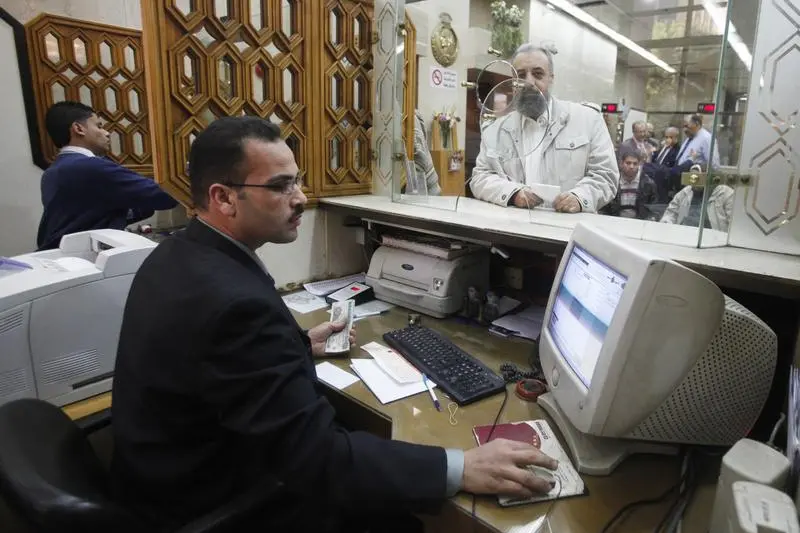PHOTO
By Asma Alsharif and Nadia El Gowely
CAIRO, Oct 25 (Reuters) - Egypt's central bank has advised some banks to redesignate their bond holdings so they cannot be traded on the secondary market, bankers told Reuters on Tuesday, a move they said was intended to shield lenders from an expected spike in interest rates.
Economists widely expect a steep devaluation in the pound but say such a bold move would be accompanied by a significant hike in key interest rates to stabilise the currency, attract inflows and avoid dollarisation.
Three bankers told Reuters on Tuesday that the central bank had verbally instructed them to reclassify "available for sale" bonds and bills, which are tradeable on the secondary market, as "held to maturity".
That would mean they do not have to mark the bonds' value to market, protecting the banks in question from a major hike to benchmark interest rates which would decrease the capital value of the bonds and hit the overall value of bank holdings.
There was no official statement from the central bank. Central bank officials contacted by Reuters did not respond to requests for comment.
"What the central bank is doing is protecting banks from making huge losses on their portfolios, revaluation losses, which could occur if interest rates rise," one banker at a private sector bank said.
"This hints at a huge hike in interest rates. It sends a very strong signal that a large devaluation is imminent and that there will be interest rate hikes to accompany."
Egypt has struggled to earn dollars since a popular uprising in 2011 caused an exodus of tourists and foreign investors, its chief sources of hard currency.
The dollar shortage has put downward pressure on Egypt's pound, which the central bank sets at 8.8 to the dollar but which has depreciated to about 16 pounds on the black market.
Large losses in treasury bills and bond portfolios could push banks below the required capital adequacy ratio and the bankers suggested this was the chief motivation for the move.
Many Egyptian banks have a high level of exposure to government debt which has traditionally been seen as a safe, high-yielding investment.
The central bank's Monetary Policy Committee is next due to meet on Nov. 17 and economists widely expect it to raise rates.
"The verbal instructions were conveyed to selected banks, both state-owned banks and private ones, based on the size of their bond portfolios of maturities between three and 10 years and more," a source at a public bank told Reuters.
The central bank has already made significant interest rate increases this year but surprised markets by holding its policy rates steady at the last MPC meeting.
Egypt is in the process of securing a $12 billion International Monetary Fund loan to back a government reform programme aimed at slashing the government deficit and rebalancing its money market.
(Writing by Asma Alsharif; Editing by Lin Noueihed and Catherine Evans) ((asma.alsharif@thomsonreuters.com; +20225783290; Reuters Messaging: asma.alsharif.reuters.com@reuters.net))
CAIRO, Oct 25 (Reuters) - Egypt's central bank has advised some banks to redesignate their bond holdings so they cannot be traded on the secondary market, bankers told Reuters on Tuesday, a move they said was intended to shield lenders from an expected spike in interest rates.
Economists widely expect a steep devaluation in the pound but say such a bold move would be accompanied by a significant hike in key interest rates to stabilise the currency, attract inflows and avoid dollarisation.
Three bankers told Reuters on Tuesday that the central bank had verbally instructed them to reclassify "available for sale" bonds and bills, which are tradeable on the secondary market, as "held to maturity".
That would mean they do not have to mark the bonds' value to market, protecting the banks in question from a major hike to benchmark interest rates which would decrease the capital value of the bonds and hit the overall value of bank holdings.
There was no official statement from the central bank. Central bank officials contacted by Reuters did not respond to requests for comment.
"What the central bank is doing is protecting banks from making huge losses on their portfolios, revaluation losses, which could occur if interest rates rise," one banker at a private sector bank said.
"This hints at a huge hike in interest rates. It sends a very strong signal that a large devaluation is imminent and that there will be interest rate hikes to accompany."
Egypt has struggled to earn dollars since a popular uprising in 2011 caused an exodus of tourists and foreign investors, its chief sources of hard currency.
The dollar shortage has put downward pressure on Egypt's pound, which the central bank sets at 8.8 to the dollar but which has depreciated to about 16 pounds on the black market.
Large losses in treasury bills and bond portfolios could push banks below the required capital adequacy ratio and the bankers suggested this was the chief motivation for the move.
Many Egyptian banks have a high level of exposure to government debt which has traditionally been seen as a safe, high-yielding investment.
The central bank's Monetary Policy Committee is next due to meet on Nov. 17 and economists widely expect it to raise rates.
"The verbal instructions were conveyed to selected banks, both state-owned banks and private ones, based on the size of their bond portfolios of maturities between three and 10 years and more," a source at a public bank told Reuters.
The central bank has already made significant interest rate increases this year but surprised markets by holding its policy rates steady at the last MPC meeting.
Egypt is in the process of securing a $12 billion International Monetary Fund loan to back a government reform programme aimed at slashing the government deficit and rebalancing its money market.
(Writing by Asma Alsharif; Editing by Lin Noueihed and Catherine Evans) ((asma.alsharif@thomsonreuters.com; +20225783290; Reuters Messaging: asma.alsharif.reuters.com@reuters.net))





















